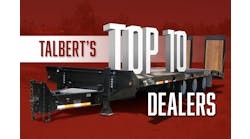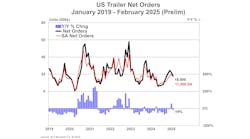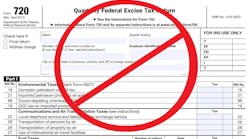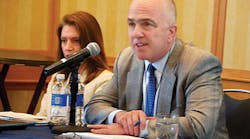Congress is taking yet another swing at repealing the expensive and complicated federal excise tax (FET) on heavy-duty highway vehicles. But while truck, trailer, and equipment manufacturers and dealers, along with their customers, are all for doing away with the 12% charge and paperwork headaches, industry representatives are taking a wait-and-see attitude: Similar legislation came and went in 2010 and 2012, and more recent legislation has been aimed at simply making sure the tax doesn’t increase. (The tax has grown from 3%, when it was incorporated into the Highway Trust Fund in 1955, to 12% today.)
The legislation, “Heavy Truck, Tractor and Trailer Retail Federal Excise Tax Repeal Act of 2017” (H.R. 2946) by Rep. Doug LaMalfa’s (R.-CA), details the history and impact of the FET: First introduced in 1917 to help finance World War I, the current 12% FET is the highest percentage rate of any Federal ad valorem excise tax, and it “routinely” adds $12,000-$22,000 to the cost of a heavy truck, tractor, or trailer. This while a series of federal emissions regulations have added $39,183 to the average truck cost, meaning an additional $4,700 FET.
“The excessive 12% federal excise tax on heavy trucks adds tens of thousands of dollars to truck purchases and directly impacts the cost of food, consumer goods and other products Americans need. Even worse, truck owners large and small pay this tax whether a truck is driven 100,000 miles or never driven at all, forcing them to pay taxes on an investment that may not be generating any revenue,” said LaMalfa, who owns and operates a small trucking company. “Repealing the truck tax will help small businesses invest in new equipment while jump-starting domestic manufacturing, and Congress should address this issue as we consider how to reform our outdated tax code.”
However, the bill is short on specifics, suggesting simply that “Congress should consider a more reliable and consistent revenue mechanism to protect the Highway Trust Fund.” And, as National Trailer Dealers Association (NTDA) President Gwendolyn Brown told TBB, getting Congress to come up with a long-term fix for the Highway Trust Fund has been an uphill pull for the trucking industry for more than decade.
Along with the direct cost, Brown also points to the “problematic” application of the FET, which can allow a handful of less-reputable dealers to put dealers who are in compliance at a pricing disadvantage. And many of the FET rules are outdated, when it comes to assessing modern equipment—but it would be “a whole other ballgame” to address what should and shouldn’t be taxed. (To help with compliance, NTDA has established an FET hotline.)
"The Federal Excise Tax has long been an unfair method of taxing the truck and trailer industry. NTDA has supported open discussions and proposals to amend the law to make it more fair over the years, but efforts to make even minor changes to the FET law have met legislative roadblocks due to the enormous size of the tax revenue generated by FET,” Brown said. “Fair or unfair, the government is collecting a huge amount of money every year under the current tax and any changes that are not revenue neutral at worst have been shot down. The NTDA would support anything that would make the legislation more fair and either reduce or cap the amount of FET."
“NTEA is a long-time supporter of FET repeal, and we applaud Rep. LaMalfa’s efforts with H.R. 2946,” said Steve Carey, NTEA executive director. “The 12% federal retail tax on heavy trucks, bodies, chassis and trailers is an inefficient and unstable means of support for the Highway Trust Fund and serves as a deterrent to the sale of new, cleaner and safer trucks.”
Similarly, Truck Trailer Manufacturers Association (TTMA) President Jeff Sims said the group has generally supported “nixing the FET” because it’s “a hindrance to buying better, safer equipment.”
American Truck Dealers (ATD) Chairman Steve Parker urged Congress to include H.R. 2946 in the upcoming tax reform bill, and also cited the resulting delay in the deployment of cleaner, safer and more fuel-efficient trucks.
“This outdated tax is also essentially a tax on American jobs. It’s time for Congress to take a hard look at the FET and determine if this tax has outlived its usefulness,” added Parker, president of Baltimore Potomac Truck Centers, which operates five full-service commercial truck dealership locations in Maryland and Virginia. “The FET hurts truck sales and inhibits job growth, directly affecting the 7.3 million Americans employed in the U.S. trucking industry.”
H.R. 2946 now heads to the House Ways and Means Committee. Its progress can be tracked here.











